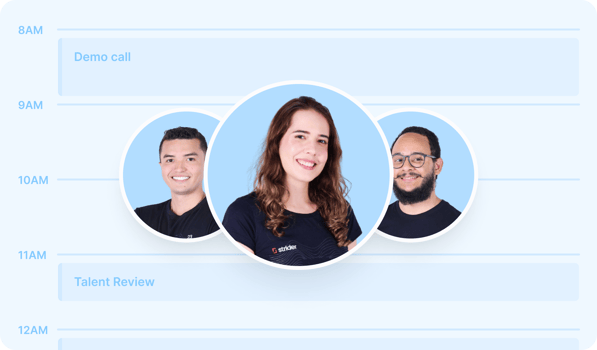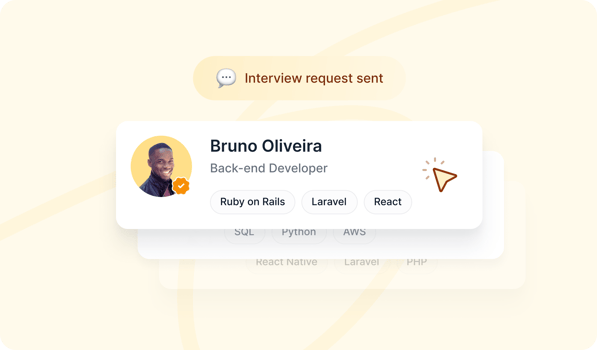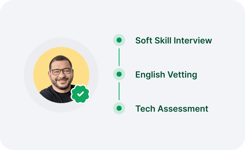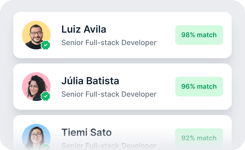Hire Remote C# developers on-demand in 2025
C# is a powerful and versatile programming language widely used for developing software applications, web applications, desktop applications, mobile apps, and games. C# is part of the .NET framework, a set of tools and libraries that allow developers to create reliable software applications quickly and easily. With the increasing demand for software development in various industries, the need for skilled C# developers has also increased.
Hiring C# developers can be challenging, especially in today's competitive market. Finding qualified developers with the technical skills and experience necessary to conceptualize and build functional and productive applications is crucial. Whether you're looking to hire in-house developers or outsource to a reliable software development agency, it's essential to understand the job description and the required technical and soft skills to ensure you hire the best fit for your team.
This article will provide tips on effectively hiring C# developers. We'll cover the essential technical and communication skills required for C# developers, the different types of C# developers, the hiring process, and the most efficient solutions to hire talented developers.
What to look for when hiring C# Developers
Technical skills
Several critical technical skills are needed when hiring a C# .Net developer. They should understand the NET framework and develop applications using C# proficiently. Furthermore, they should be familiar with other Microsoft technologies such as ASP.NET, SQL Server, and Azure. In addition, they should have experience with object-oriented programming and design patterns and have a good understanding of software architecture principles.
Another important technical skill for C# developers is experience with web development technologies such as HTML, CSS, JavaScript, and jQuery. Ideally, they should also be familiar front-end frameworks such as Angular or React. Experience with testing frameworks such as NUnit or xUnit is also essential, as is knowledge of source control tools like Git.
Communication skills
While technical skills are essential, communication skills are equally crucial when hiring C# developers. They should be able to communicate effectively with other technical and non-technical team members and explain complex technical concepts in a way that is easy to understand. Strong written and verbal communication skills are a must.
C# developers should also be able to work collaboratively in a team environment and be open to feedback and constructive criticism. They should be proactive in identifying and resolving technical issues and be able to work independently when required.
Experience with Cloud Computing
As cloud computing becomes increasingly prevalent in the tech industry, experience with cloud technologies is becoming more critical for C# developers. Familiarity with cloud computing platforms such as Microsoft Azure, Amazon Web Services (AWS), or Google Cloud Platform (GCP) is highly desirable. C# developers should be able to create cloud-based applications and services that are scalable, secure, and highly available.
Knowledge of Machine Learning
With the increasing use of artificial intelligence and machine learning in software development, C# developers with knowledge of machine learning concepts and tools are in high demand. They should have a good understanding of machine learning algorithms and frameworks such as TensorFlow or PyTorch and be able to develop applications incorporating machine learning. Experience with data analysis and visualization tools such as Power BI or Tableau is also beneficial.
Top 5 technical C# Interview Questions
As someone looking to hire C# software developers, asking the right interview questions to evaluate their technical skills and expertise is essential. Here are the top 5 technical interview questions to ask a C# developer:
Can you explain the difference between a struct and a class in C#?
This fundamental C# interview question can help you evaluate the candidate's knowledge of C# data types. A struct is a value type allocated on the stack, whereas a class is a reference type allocated on the heap. A good candidate should be able to clearly and concisely explain the differences between the two.
What is the difference between an abstract class and an interface in C#?
This is another fundamental C# interview question that can help you evaluate the candidate's understanding of C# class types. An abstract class is a class that cannot be instantiated and can only be used as a base class for other classes. An interface, on the other hand, defines a contract that a class must implement. A good candidate should be able to provide a clear and concise explanation of the differences between the two and when to use one over the other.
What is LINQ, and how do you use it in C#?
Language Integrated Query (LINQ) is a powerful feature in C# that allows developers to query data from different data sources. This question can help you evaluate the candidate's experience with using LINQ and their understanding of LINQ syntax. A good candidate should be able to explain the basics of LINQ, such as how to use it to query collections and databases and provide examples of LINQ syntax.
What is the role of delegates in C#?
Delegates are a powerful feature in C# that allows developers to encapsulate a method and pass it around as a first-class object. This question can help you evaluate the candidate's understanding of delegates and their experience using delegates in C#. A good C# software developer should be able to explain the concept of delegates and provide examples of how they have used delegates in their past projects.
What is the difference between a synchronous and an asynchronous method in C#?
This question can help you evaluate the candidate's knowledge of asynchronous programming in C#. Asynchronous methods allow developers to execute long-running operations without blocking the main thread. A good candidate should be able to explain the difference between synchronous and asynchronous methods and provide examples of how they have used asynchronous programming in their past projects. Additionally, they should be able to discuss the potential drawbacks and benefits of using asynchronous programming.
By asking these technical C# interview questions, you can better understand the candidate's knowledge, experience, and problem-solving abilities, which are all critical for a C# developer.







